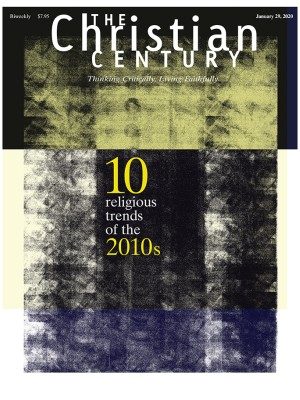February 2, Epiphany 4A (Matthew 5:1–12; Micah 6:1–8; 1 Corinthians 1:18–31)
Matthew’s Beatitudes are meant to give comfort, not to challenge.
The lectionary gives us two iconic biblical texts this week, both of which offer words of hope to all people and particularly to those with little power in society. For preachers, this begs for some creativity.
Both Matthew’s Beatitudes and Micah’s plea to do justice, love mercy, and walk humbly present math counter to secular intelligence: What is a fair sacrifice? Who is due a plum inheritance? Reading them alongside the 1 Corinthians text provides a bit of insight into how we might do the things that Micah and Matthew call for.
Matthew’s Beatitudes begin the Sermon on the Mount. Jesus has a vast crowd gathered around him, hungry for a word. He goes up the mountain—as he does later for the transfiguration (17:1) and to give his parting commandment (28:16), and as Moses does to receive the law (Exod. 19). Jesus sits down, assuming a rabbinic posture of teaching. He is going to impart some wisdom.
Read our latest issue or browse back issues.
Notably, Matthew’s Beatitudes—unlike the Lucan parallel that was part of this past All Saints’ reading—do not include woes. Matthew’s woes come much later. At this point Matthew’s Gospel is focused on those who are and will be blessed (that is, favored, living with and under God’s rule—something quite different from our contemporary notions of happiness). It is a word of hope and guidance to those who suffer: those who mourn, who lack power, who are not aggressive, who are kind and are persecuted for it. These are the ones who will be rewarded. Some commentators have gone so far as to suggest the Beatitudes as a new decalogue. Given next week’s reading, in which Jesus says he has come to fulfill and not destroy the law, I’m more inclined to think of them as not a new law but a gloss on the old one.
It’s important to recognize that Matthew’s Beatitudes have an effect on listeners that’s different from that of Luke’s. Matthew’s Beatitudes give comfort to readers who struggle with oppression, while Luke’s call for a greater measure of accountability in those who actively or passively benefit from it. In naming who will be punished, Luke’s Jesus is functioning as a prophetic voice for justice. In contrast, Matthew’s Jesus is primarily focused on comforting his listeners. This might be surprising, given that we often think of Luke’s Gospel as depicting Jesus’ pastoral side. Of course, the reality is that what is pastoral and what is prophetic often go hand in hand. The pastoral message is often a prophetic one.
In Micah, those in power “tear the skin from my people.” They “break their bones to pieces, and chop them up like meat in a kettle.” They “cry ‘Peace’ when they have something to eat, but declare war against those who put nothing in their mouths” (3:2–5). Disaster befalls the people, with the Assyrian invasion in the north and the Babylonian sacking of the south. To the ravaged remnant, Micah offers hope of a future of restoration (chapter 4) and, in today’s reading, a path of how to get there: “He has showed you, O man, what is good. And what does the Lord require of you? To act justly, and to love mercy, and to walk humbly with your God.” There is no sacrifice the people can offer beyond justice and equity—a relative bargain but also a lifelong commitment.
While some religious communities may be in a situation of rebellion or remnant, many of us work in Corinthian contexts. “Not many of you are wise by human standards,” but some are. Many communities are mixed bags of powerful and disempowered, employed and unemployed, joyful and hurting. It is to this variety of persons that the words of blessing from Matthew and the energizing hope from Micah must fall.
Here the “message of the cross” or “word of the cross” provides a possible way forward. Alexandra Brown describes how flummoxing this phrase would have been to Jews and Greeks alike. In a Jewish context logos indicated the law and holy wisdom. To Greek listeners it referred to the cosmic order and an understanding of that order. The cross of Christ would appear to be an abrupt disorder or error in the cosmos, not at all in keeping with the law.
However, “God chose what is foolish in the world to shame the wise”—and the powerless in order to change worldly standards. God chose Jesus on purpose: “He is the source of your life in Christ Jesus, who became for us wisdom from God, and righteousness and sanctification and redemption” to bring abundant life. As Mary Hinkle Shore points out, the “cross of Christ,” the word of the cross, and Christ crucified are “all shorthand for God’s intervention into this age to bring about a new one.”
With texts so lofty and abstract, the challenge becomes articulating a nugget that helps people imagine their own ways of participating in the kingdom of God—where wisdom has been upended for and by the meek and the persecuted, where just acts and humble walks are taking place. Preachers might pay close attention in the coming weeks, jotting down notes whenever they see people blessing one another or acting justly. The challenge is to make the cross of Christ something we can do something with in this era of the kingdom of God.





